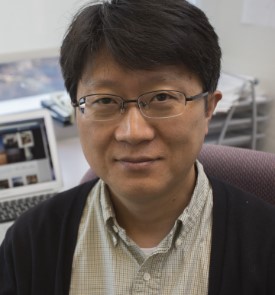Fraud Informatics Symposium
Fraud Informatics Symposium 2019
Fraud Informatics Symposium 2019 (Link to the press release) (Link to Agenda and Background)
Dr. Neal Wagner, Systems & Technology Research: What You Don't Know Will Hurt You: Relationship between AI and Fraud Informatics"
Dr. Dongwon Lee, Pennsylvania State University: "Cyber Fraud: Phishing, Astroturfing, Fake News, and Deepfake"
Fayetteville State University, Fayetteville, NC
Thursday, October 24, 2019 8:00 am - 4:00 pm In association with Pennsylvania State University and Oak Ridge Associated Universities (ORAU) The Fraud Informatics Symposium 2019 is in support of the NSF Award DGE-1820609, Developing and Evaluating Fraud Informatics Curriculum among Institutions in the Appalachian Region. The purpose is to introduce instructors and faculty members to a new curriculum, Fraud Informatics, developed by Dr. Dongwon Lee at Penn State. The Symposium focuses on the development and implementation of the new curriculum, engage participants in discussions about the topics of Fraud Informatics, and recruit instructors and faculty members to deliver the curriculum to their students. To offset expenses and enable broad representation of instructors from around the Appalachian region, travel awards are being given to 8 instructors.
Fraud Informatics emphasizes the importance of information/data processing and the involved information systems toward the detection and prevention of online fraud. Fraud Informatics levels up the scale and scope of the problem of online frauds from simple analytics to the whole dimensions of "informatics."
SPEAKERS

Dr. Dongwon Lee is an associate professor in the College of Information Sciences and Technology (a.k.a. iSchool) of Pennsylvania State University, USA. From 2014 to 2017, he has also served as a program director at National Science Foundation (NSF), comanaging cybersecurity programs such as SFS and SaTC with the yearly budget of $55M. He researches broadly in Data Science, in particular, on the management of and mining in data in diverse forms including structured records, text, multimedia, social media, and Web. He is also interested in applying the human computation framework to solve data science problems and detecting/curbing challenging online frauds using machine learning techniques. He leads the PIKE (Penn State Information Knowledge and web) research group.

Dr. Lynn Bible is an Associate Professor of Accounting at Fayetteville State University since 2011. She received her PhD from the University of Connecticut. Dr. Bible's research focus is accounting ethics, fraud, and auditing. She has published in journals such as the Journal of Accounting, Auditing and Finance, Accounting Education: An International Journal, Management Accounting Quarterly, and The CPA Journal. Dr. Bible is a Certified Public Accountant and a Certified Fraud Examiner. She is a member of the American Institute of Certified Public Accounts and the Association of Certified Fraud Examiners.

Dr. Neal Wagner is a Complex Systems Scientist at Systems & Technology Research, Massachusetts, USA. His focus lies in developing problem-solving methods, tools, and techniques that combine artificial intelligence and complex system modeling and simulation to create intelligent decision-making systems. Prior to joining Systems and Technology Research, he was a research scientist at MIT Lincoln Laboratory in the Cyber Analytics and Decision Systems Group where he focused on AI applications to Cyber Security. Prior to MIT, he was at SolveIT Software, where he specialized in the commercialization of bio-inspired computing techniques for supply chain optimization of large organizations. His academic experience includes stints as a faculty member of the Computer Science and Information Systems Departments at Augusta University and Fayetteville State University. Dr. Wagner holds a BA degree in mathematics from the University of North Carolina at Asheville and an MS degree in computer science and a PhD degree in information technology, both from the University of North Carolina at Charlotte.
